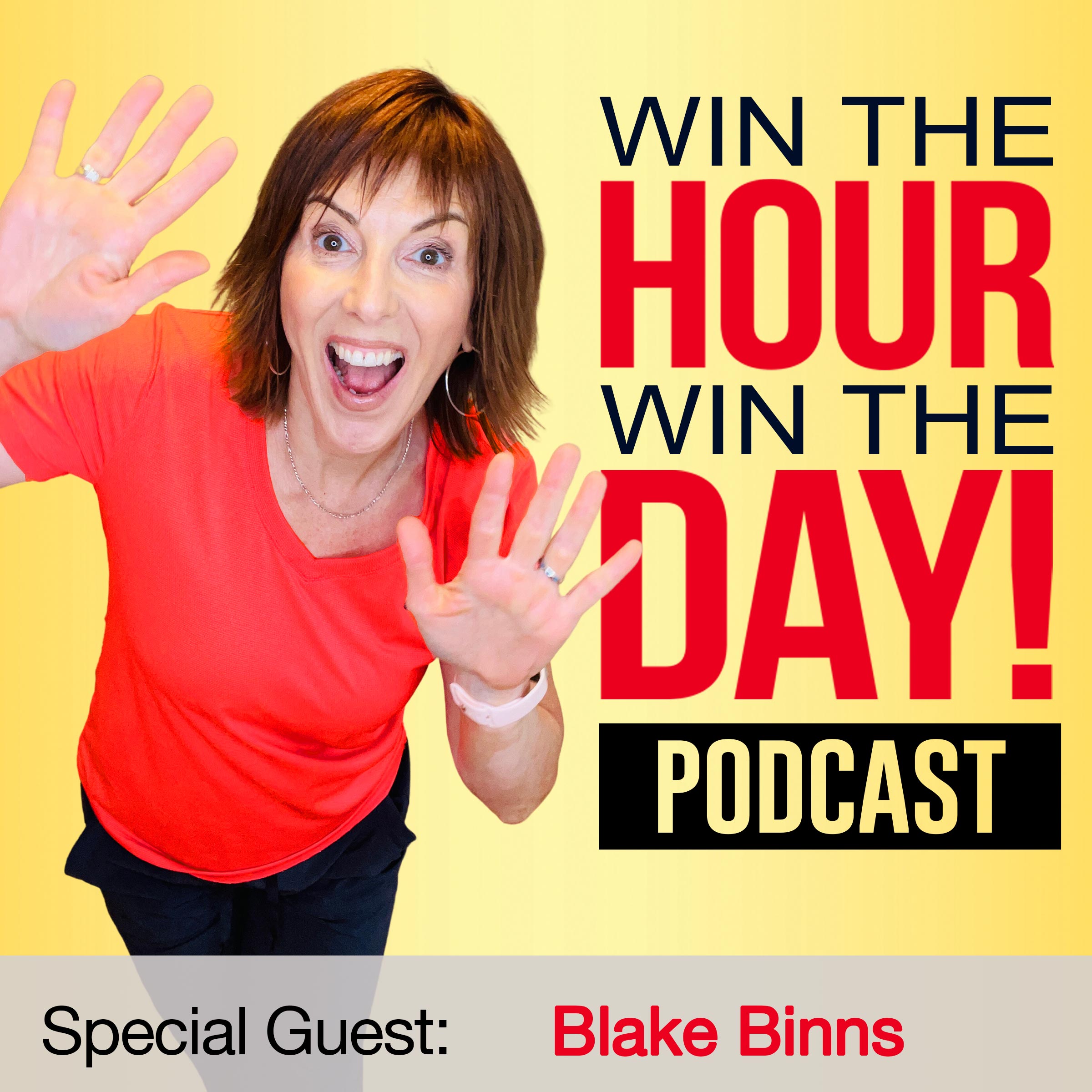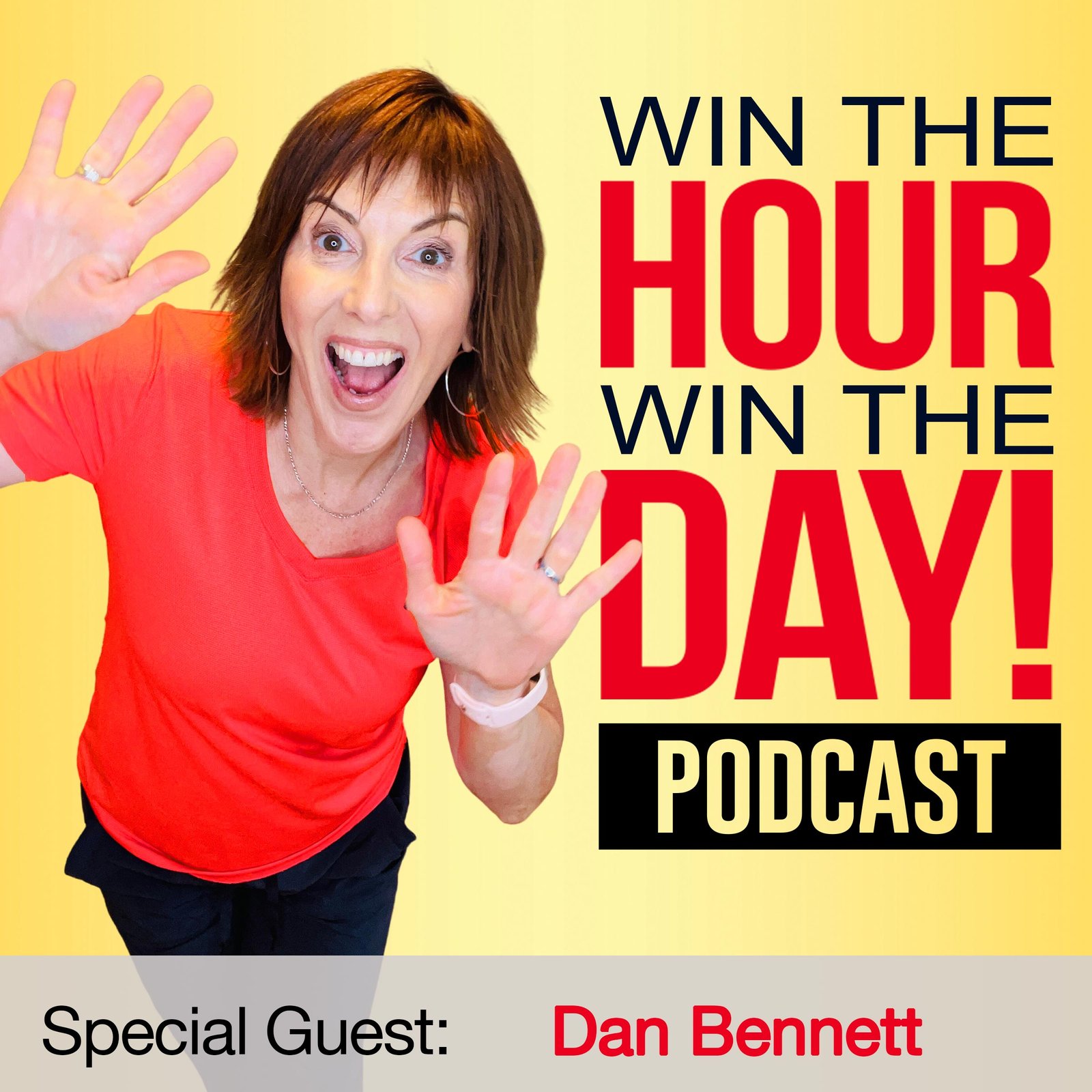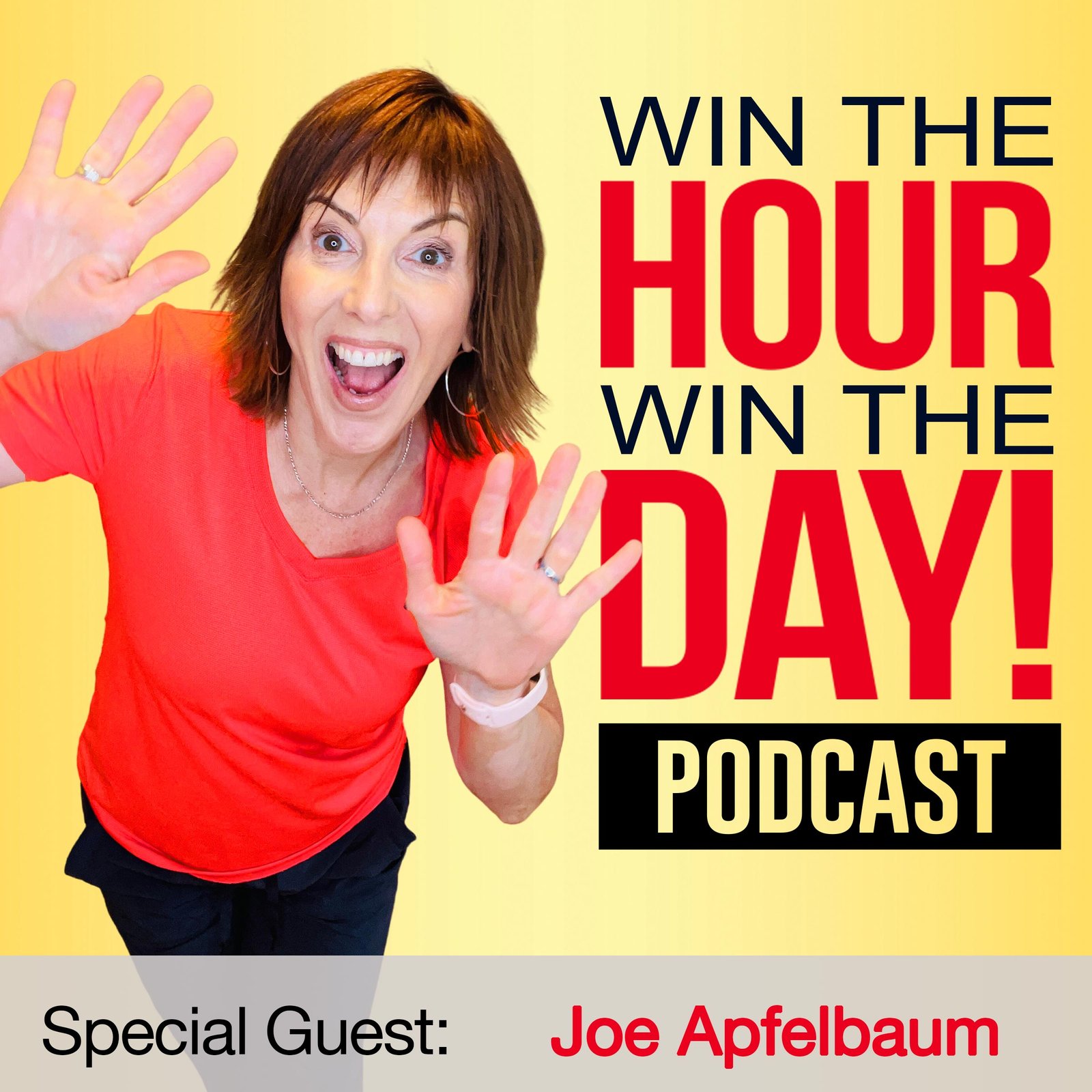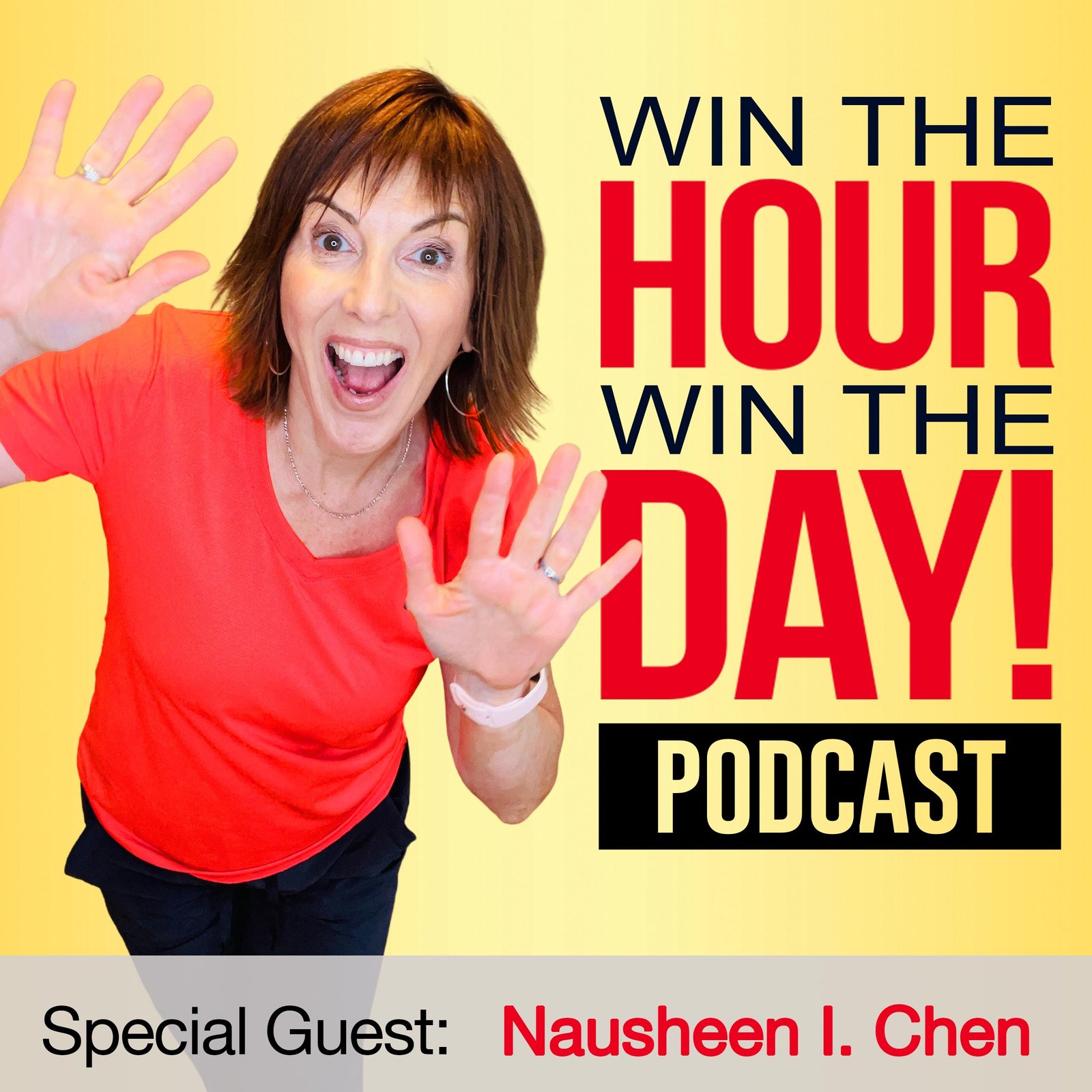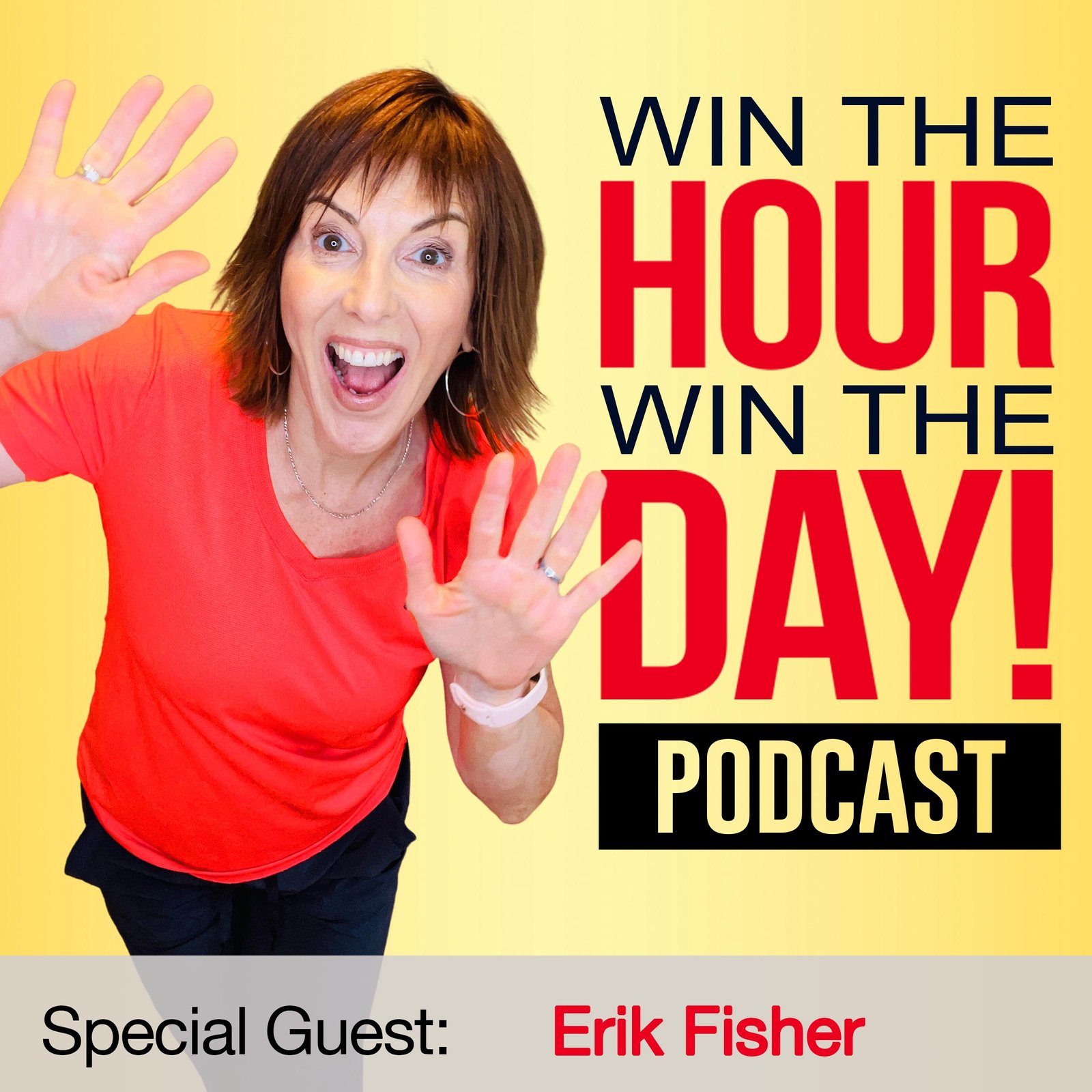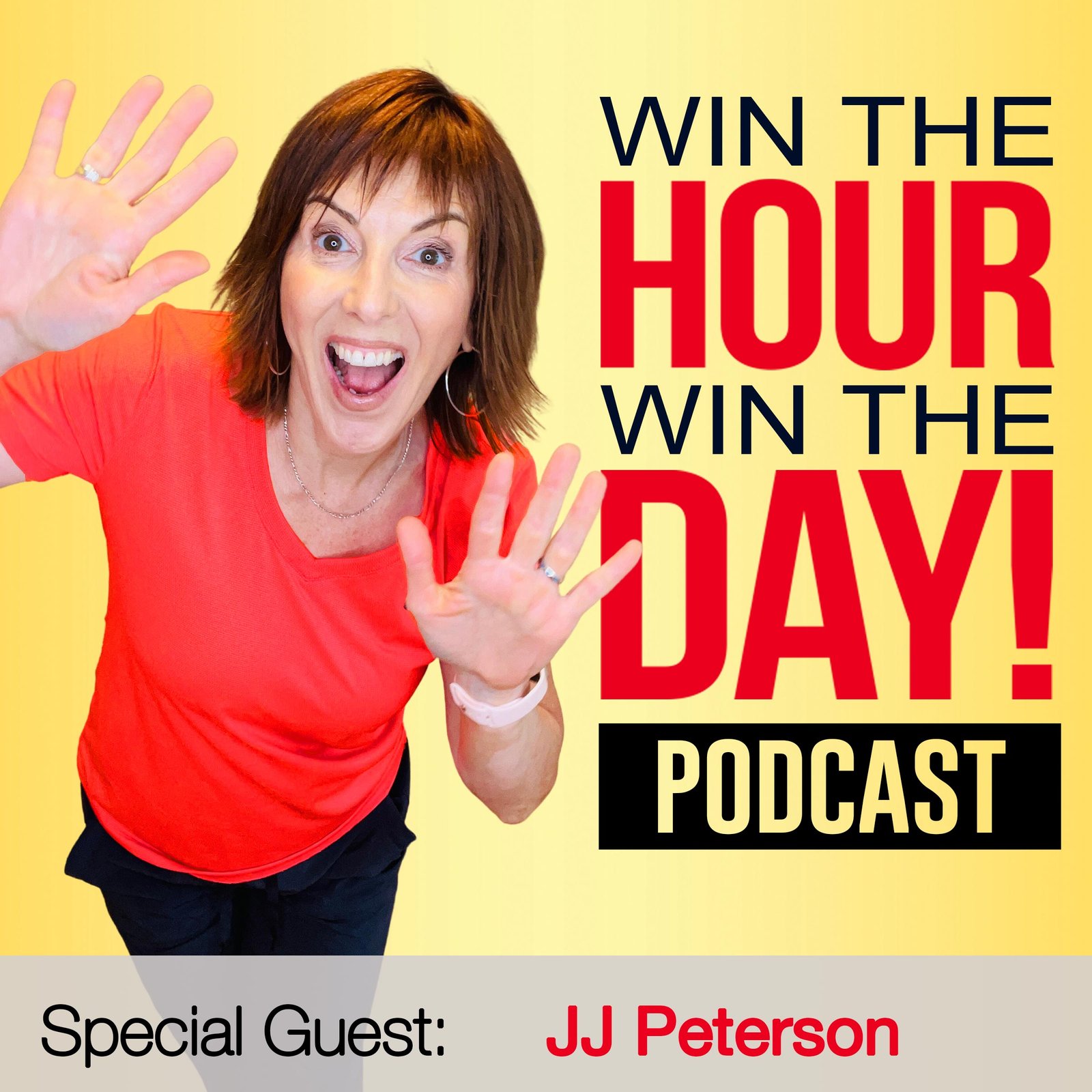Episode Summary This week’s episode of Win The Hour, Win The Day Podcast is...
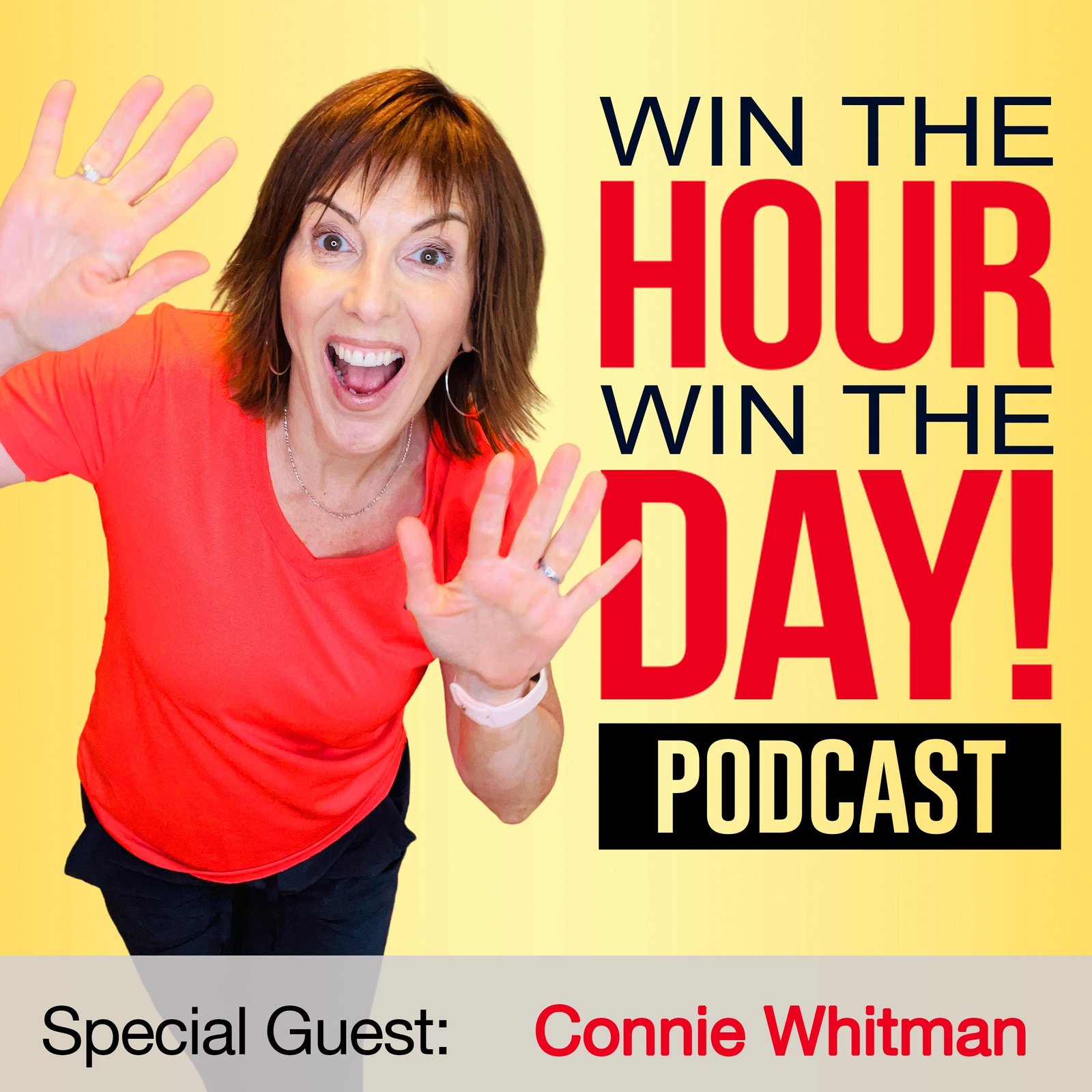
Are You Ready For Your Next Big Win?
Know your entrepreneur personality and I’ll take it from there!
Recent Podcast Episodes
Preventing Burnout with Smart Work Tools! with Kris Ward
Episode Summary This week’s episode of Win The Hour, Win The Day Podcast is...
Master Social Selling: Heidi Medina’s Strategies for Engagement
Episode Summary This week’s episode of Win The Hour, Win The Day Podcast is...
Boost Productivity and Master Storytelling! with AmondaRose Igoe
Episode Summary This week’s episode of Win The Hour, Win The Day Podcast is...
Master Video Marketing: Top Tips for Entrepreneurs with Dan Bennett
Episode Summary This week’s episode of Win The Hour, Win The Day Podcast is...
Boost Your LinkedIn Strategy with AI Tools for Enhanced Productivity! with Joe Apfelbaum
Episode Summary This week’s episode of Win The Hour, Win The Day Podcast is...
Mastering Personal Branding with NLP Techniques! with Olesija Saue
Episode Summary This week’s episode of Win The Hour, Win The Day Podcast is...
Innovative Lead Generation and Email Automation Secrets with Jennie Wright
Episode Summary This week’s episode of Win The Hour, Win The Day Podcast is...
PR Strategies for Diverse Entrepreneurial Impact! with Jennifer Singh
Episode Summary This week’s episode of Win The Hour, Win The Day Podcast is...
Convert More Clients on LinkedIn with Richard Moore
Episode Summary This week’s episode of Win The Hour, Win The Day Podcast is...
Master Business Growth on Pinterest with Meagan Williamson
Episode Summary This week’s episode of Win The Hour, Win The Day Podcast is...
24/7 Sales Boost: Video Marketing Secrets with Alex Sheridan
Episode Summary This week’s episode of Win The Hour, Win The Day Podcast is...
Master Public Speaking Tips with Nausheen Chen!
Episode Summary This week’s episode of Win The Hour, Win The Day Podcast is...
Craft Your Social Media Content Strategy With Shannon McKinstrie
Episode Summary This week’s episode of Win The Hour, Win The Day Podcast is...
Boost Your Productivity with AI Tools: A Deep Dive with Erik Fisher
Episode Summary This week’s episode of Win The Hour, Win The Day Podcast is...
Boost Visibility: Repurpose Content and Leverage Podcasts With Christina Lenkowski
Episode Summary This week’s episode of Win The Hour, Win The Day Podcast is...
Master Personal Branding & Storytelling with Lisa McGuire
Episode Summary This week’s episode of Win The Hour, Win The Day Podcast is...
Boost Business on LinkedIn with Catherine B. Roy’s Strategies
Episode Summary This week’s episode of Win The Hour, Win The Day Podcast is...
Scale Your Business: Optimizing Virtual Assistant Services with Kris Ward & Rachel Eubanks
Episode Summary This week’s episode of Win The Hour, Win The Day Podcast is...
Affordable PR Mastery: Crystal Richard Unveils Modern Techniques
Episode Summary This week’s episode of Win The Hour, Win The Day Podcast is...
Mastering Business Storytelling with JJ Peterson’s Guide
Episode Summary This week’s episode of Win The Hour, Win The Day Podcast is...
Revamp Your About Page: Guide to Personal Branding
Episode Summary This week’s episode of Win The Hour, Win The Day Podcast is...
LinkedIn Mastery and Video Marketing Secrets with Alex Sheridan
Episode Summary This week’s episode of Win The Hour, Win The Day Podcast interviews,...
The Systems and Processes Playbook: Insider Secrets to Streamlining Your Small Business with Leah Abunales
Episode Summary This week’s episode of Win The Hour, Win The Day Podcast interviews,...
Getting Noticed: PR Strategies with Dina Behrman
Episode Summary This week’s episode of Win The Hour, Win The Day Podcast interviews,...
Beating The Burnout With Connie Whitman’s Success Story
Episode Summary
This week’s episode of Win The Hour, Win The Day Podcast interviews, Connie Whitman.
You’re always running but getting nowhere…
That’s burnout — your ambition’s shadow.
Join me as Connie Whitman shares her journey from burnout to breakthrough.
This episode will show you:
-How burnout disguises itself as passion, tricking you into overwork.
-The challenge of juggling work, family, and personal time.
-Connie’s strategies for stopping the endless work cycle and enhancing both life and work.
Reclaim your energy and enjoy your days…
to the fullest with practical tips.
Let’s get your energy back and make every day better!
Power Personality Quiz! http://winbacktimequiz.com/
Win The Hour, Win The Day! www.winthehourwintheday.com
Podcast: Win The Hour, Win The Day Podcast
Facebook: https://www.facebook.com/winthehourwintheday/
LinkedIn: https://www.linkedin.com/company/win-the-hour-win-the-day-podcast
You can find Connie Whitman at
Website: changingthesalesgame.com
Email: connie@changingthesalesgame.com
Win The Hour Win The Day
https://winthehourwintheday.com
Connie Whitman Podcast Transcription
[00:00:00] Kris Ward: Hey everyone, welcome to another episode of Win The Hour Win The Day. And I am your host, Kris Ward Ward. And today we have Connie Whitman in the house. Now, Connie Whitman is changing the sales game, but listen, we’ve had Connie on the show talking about sales before, and it is an amazing show.
[00:00:16] And we should have her back again because we can never talk enough about sales. But today, Connie is going to give us the inside scoop. She’s going to talk to us about burnout and give you the behind the scenes of what it’s like to work with yours truly because when we met Connie, she was in a sort of a unique situation.
[00:00:34] So let’s dive in, pull the curtains back and let’s get to it because I think burnout is not talked about enough. Would you agree? Connie.
[00:00:44] Connie Whitman: Yes, Kris. 100%. And I think the other problem, not problem, but the other thing that we feel when we’re in burnout, we don’t realize we’re in burnout. And we, what happens is I feel like we dig deeper and just the right or the non movement or ability to not move forward gets deeper and deeper and harder and harder to come out of. Cause we don’t know what’s always
[00:01:06] happening.
[00:01:07] Kris Ward: A hundred percent. And you know what? I recently come up with this and forgive me. I think it’s wise. Let me re qualify this. I think this is my revelation. Burnout disguises itself as ambition and passion. And so for me, what that looked like is it’s like, Oh my gosh, I’m starting this new course.
[00:01:26] So I don’t care if I do it all Sunday, or I’m really excited about this new client, new project. So I would come into the evening or say, no, I’m going to work on that Saturday to get a headstart. Cause I’m really excited about it. And. And I didn’t understand that setting boundaries on myself when, and I hear people sometimes now Oh, what do you do for fun?
[00:01:42] Oh, I love my work. I work day and night. I’m like, okay that tells me a whole bunch of things about yourself and none of it’s good. But I think we get seduced into thinking, cause we love what we do, that it’s okay to do it day and night. And it’s not. And then to your point, burnout, I know when I had burnout, you’re right, I didn’t know what it was.
[00:02:00] I was like, I wonder what’s wrong with me. Suddenly I cared so much yesterday and now I’m like indifferent to it. What’s that? And I’m like my throat’s not sore. Like you start looking for symptoms. Like why am I suddenly my personality changed? So you were in burnout and you didn’t recognize it. Where did it unfold for you?
[00:02:18] Connie Whitman: I could share the story when I first had my kids very briefly. That was, I think the first time because you like, like you, right? We are overachievers. We buy we used to buy into that hustle culture that if you’re not working, you’re not going to be successful.
[00:02:34] If you’re not working, you’re not going to be financially stable for your family. And I remember when I started my business, my children were young. I went in a four year old at home and I remember pulling in the driveway after going to their preschool. I had a mother help and help in the school.
[00:02:47] It was a co op and all of these other demands now as a mom. And I pulled in the garage and I just burst into tears. I couldn’t get out of the car. And finally my husband’s came out, what’s going on? And he sees me crying and I’m not a crier. I’m a doer. There’s a problem. Let’s fix it. Let’s get it done.
[00:03:03] And I said to him, I’m failing. I can’t do everything. So I think part of the problem, and I know guys listen to the show too, Kris, but I think, and maybe men do it now more current day, but back then I felt I have a business. I have children. I’m a wife. I have a house. I have these I should do it all like I was super woman.
[00:03:22] And that was my first flaw. And that took me a long time to work through with my business, with my kids. And then you find the balance cause you’re forced with children, but then fast forward COVID. And that’s why I think I knew something was going on. And that’s when you and I met and I reached out and said, I think I need help.
[00:03:40] I identified that I was in burnout again, meaning I, I felt like the world was spiraling out of control for me. And I didn’t know where I was missing and what I should be doing because COVID changed my whole business model. Because my business stopped overnight, literally overnight.
[00:04:00] Kris Ward: So you there’s a couple of things I want to unpack there that you brought up that really important.
[00:04:03] So you talked about all the roles in your life and thinking I didn’t know how to stop any of them or decrease any of them. And the, a lot of the clients I work with myself included is I was always the go to person for a lot of people in my life. Cause I was a doer cause I moved quickly. I’m high energy.
[00:04:18] I get stuff done. And so then what happened was I just assumed, “Hey, if I can’t get it done, there’s just too much to do.” But I would take on more and more. Cause it’s, you know what, my sister needed help. My mother needed help. It’s okay, let me do that for you. It’s easier just for me to do it and get it done.
[00:04:34] And then you don’t realize how much you’re taking on. So it’s not one of these shows where we’re talking about, Oh, society. It’s But high achievers, high energy, ambitious people. Sometimes I read a book once and he was talking about the real discipline is learning how to say no to things and not fill it with something, learning how to say Oh, that relaxing is a thing.
[00:04:57] Cause I always thought if I wasn’t going a thousand miles an hour, like regular speed was slow and it seemed why are you being lazy today? You should get more like I confused speed with efficiency, where in fact I learned that speed often I skimmed over things. I wasn’t getting traction. I was just in hysterical mode all the time.
[00:05:15] We actually now have a quiz. Some of this our power personalities check it out. Cause they’ll tell you yours. Mine is I’m a recovering rushaholic. Okay. So you brought up some really good points there. So now. We go to, all right, you’re burnt out, your business changed overnight because you were dealing with corporations and everything was shut down.
[00:05:34] And then you’re led to believe when there’s a problem, throw your back into it, work harder. But in that situation, everything was closing. So what the heck were you supposed to do? So burnout, how do you crawl out of burnout? Where do you start?
[00:05:49] Connie Whitman: So the the, I’ll tell you the mistake I made and I’ll never do it again is I just started taking every online class.
[00:05:56] I, if it was a topic I didn’t know about, I’ve got to learn about that because I might need that. Let me learn. Let me learn. And that’s when I started working. It was so funny, right? The world shut down. Everybody’s watching Netflix and cleaning their cupboards. And I was working 12 hour days, seven days a week.
[00:06:11] And I had no income coming in. Talk about the definition of insanity. Yeah. Yeah. Yeah. And so that will never happen again. So I forgot, being in business for 19 years at that point, I always thought strategically, yet I stopped because something externally was impacting me and I wasn’t sure what that next step was.
[00:06:32] So what do you do? I was me. Just like you said before, high energy go figure it out. Learn that you heard that you don’t know what it means. It really was a time of craziness. And then can I just fast forward to when I met you? Yeah. Yeah. So when we met through networking or something, I don’t even quite remember.
[00:06:51] But whatever you said, I or someone introduced us, but whatever you said, I thought, Whoa, like it literally made me stop in my tracks, Kris. And I thought, I feel like this is something I need to focus on because she understands the craziness I’m living in and that it’s not okay. And then from there I worked with you, which was a godsend.
[00:07:13] We super toolkits, my VA, talk about freeing up time. And the other thing that I think was really important. And I’m still living by that, for three years ago when I met you and I’m still living is, and you said it before setting boundaries. I am very comfortable saying no, I’m very comfortable delegating now that I can’t do it all.
[00:07:34] Or I am very clear as to when my schedule will free up. So if you need it now, I’m not person for you. This is when I can accommodate you. So I think the boundaries and learning to say no, as well as the super tool kits and all those efficiencies that I was doing the same thing, an email, for example, I was sending the same email.
[00:07:54] 50 times a week, duh, right? Yeah. Now, when I look back, I was like that was obvious, but it’s not because you can’t see the forest from the trees when you’re in burnout. That’s what I have.
[00:08:04] Kris Ward: No. And then to be fair to you, Connie, what happens to is you mentioned a couple of things. So we focus on team, time and toolkits, right?
[00:08:12] And the time is learning how to use your calendar. 90 percent of people do not know how to use their calendar effectively. So what you’re saying now is I can set boundaries. You can set boundaries because you can see clearly what your inventory is as far as time, because you know how to use the calendar.
[00:08:25] So that’s a big deal. You’re aware of, Oh, if I take that on, these other things are going to get squished. It’s, I call it your time bank account. Like you look at your bank account. You’re like, Oh, I can’t afford. It’s just not, it’s. That’s going to bounce. I cannot bring that through. I don’t have the funds for it yet because we don’t use our calendar correctly.
[00:08:42] You don’t realize when you’re at a deficit, right? Until it’s some crazy hour in the morning. So that’s a big deal. And then I think when you talk about whipping off an email 50 times in a row, it happens sporadically and it happens at different times. And then you think Oh, you’re in such for, at least I was in such back in the day.
[00:09:00] In chaos, hysterical mode that you think, Oh yeah, I’ll just do this email one more time. And because you have no, because you have no way to monitor how many one more times that has now been, you’re in survival mode. So you’re just like, I’ll just tread water for five more minutes. I’ll deal with that later.
[00:09:16] I remember back in what I call my dark years, the first couple of years I was in business and suddenly I heard myself, here’s the two things. It’s once I get past this next thing what the, how many times are you going to say that 10 years in, right? Or, I’ll deal with that later.
[00:09:29] When’s later, when do I, we don’t have time now. Why am I going to have time later? So I think. It’s so easy to one off things and to, I often think we, people think they have a business, but they’re self-employed and at best. And I often say too, that, business should be fun or you could have stayed at a job you didn’t like.
[00:09:48] But more importantly, I remember one time when my business was brand new, I was working, it was like two o’clock in the morning. I’ve been up since five. And I thought, you know what? People fought and died for labor rights. If you asked me at a job to get in at five and leave it to I would have you on the news, but luckily we talk about freedom with the freedom lifestyle of having your business.
[00:10:08] I have the freedom to run myself into the ground until I fall over exhausted is what I am. So let’s dive in a little bit deeper. So we found, hired, and on board and brought in a VA, a virtual assistant for you and showed you how to utilize them so that it would be effective. And not something that you just overload your tasks that you can’t keep up on and all that other stuff, right?
[00:10:28] And delegate. Cause we don’t believe in delegating. It’s a lateral move. This person has responsibilities and independence and you lean on them. So what, how did that compare to what you were doing before?
[00:10:39] Connie Whitman: So it was interesting because I remember when you first, we onboarded the VA and we met, you met with me with them.
[00:10:46] And I remember thinking, but what am I going to give her to do? I, here’s the ego. I have to do everything. Yeah. Do I… and so you were like, start with five hours a week. I’m like come on. I could give her stuff to fill five hours a week now. And of course I did. And then as she and I got to know each other, and this is exactly the template you share, right?
[00:11:09] As we got to know each other, I, she was like, Oh, I could do that. And I’d be like, Oh yeah, that would be great. So you talk about it in the meeting. She tries it, sends it to me for approval, right? Because we have to make, we have to learn each other’s language and what we’re meaning behind what we’re saying.
[00:11:23] And then we did that. And then before you knew it within a month, I think she was up to 40 hours a week and we haven’t looked back. And I will share, this is the importance of this, that the level of trust, but you have to communicate clearly and you have to you have to give them the power to also put in what they think, because we know it’s my business.
[00:11:46] I should be doing it alone. It’s my decisions. Yes. But what are you missing? So having my VA happens to be much younger than me. She see things. These things with the technology that I just, it wouldn’t even hit my radar because of my age where it’s part of, how they do business. So I, right out of the gate, I said to her, you have something that you think is important or that I should be doing that I’m not mentioning.
[00:12:11] Mention it. I want to empower you because I don’t know everything. And I’ll tell you, initially, she would say to me things like, would it be okay if I share my opinion? And I’m like, yes, that’s what I hired you for this. And now she freely says, okay, Connie, I’m weighing in on this. So you get there and build that relationship.
[00:12:29] But I will tell you that was the first step. Move where I thought, holy crap, I don’t have to do everything in my business, especially more of the administrative duplication, setting up social media posts, all of that. I can approve them. She doesn’t might approve them in three seconds. And then she handles the rest of it. That’s just one example.
[00:12:48] Kris Ward: Yeah. And that’s a really good example because I often say what happens is whatever your job is, whatever your expertise is, there’s always a pre and a post to that. And people don’t realize that. And they think that then what happens is you have this thing to do and it keeps swelling and you think it’s all associated with your work, but no you’re the, the, I don’t know the stuffing in the middle of the cookie kind of deal.
[00:13:08] All that other stuff isn’t actually your work. It’s admin noise and it’s chaos and you just don’t need to do it. So that’s a really good point. And also when you talked about, we start them off really slow. Yeah. Cause you’re not ready. If you had, I tell people, if you had a million dollars, I wouldn’t start somebody full time because you, we need you to ease you into this.
[00:13:28] And yes, we have our leadership program and we teach them how to talk to you so that we can show them that, yes, I have an idea and they’re not, because also traditionally most people don’t realize that the corporate formula is very parentified. Any job we’ve had, our supervisor was like our parent and they checked our work, like our parent or a teacher, you ask permission to leave earlier.
[00:13:49] It was, it’s very like a setup, like a family unit. And what we want here is actual win team and a team where really, I don’t know how you feel, but I feel my team, like I have peers, like I come to the scrum meetings with an idea and I get feedback and it’s Oh, I’ve got a peer group here that really elevates me versus I’m this overflow work.
[00:14:13] Connie Whitman: Yeah, she’s my partner. And it’s funny when I introduce her now, my corporate clients on my learning platform that we give access, I do an intro email and I put here’s my business manager or whatever’s appropriate title, based on their infrastructure. But she has the authority and they should, if they, and I say, if you have tech issues, You need to go to her content issues.
[00:14:33] You come to me, I’m the one with the answers on sales, but she’s the one who could get you in and reset your password and all of the, I don’t want to be bothered with that. I don’t have the time to be bothered with that.
[00:14:42] Kris Ward: Yeah. And it’s not what you do. And then what people also don’t talk about, this doesn’t sound interesting, but It’s like you get decision fatigue and attention residue and the way the brain is set up, you’re over here trying to work on their sales copy for this meeting you’re gonna have with them, and then they can’t get into their program.
[00:14:59] And then you’re over there fiddling around with them and by the time that you do get them in, even if it was your strength, it’s using a different part of your brain. So then you come back to write on the copy and you’re frazzled and you’re like, okay, you know what? I’ll start that. I’ll deal with that tomorrow.
[00:15:12] ’cause that’s right. It’s just somebody, a woodpecker chipping away at your skull and you’re like, all right. That headaches over, I got them in and people just don’t understand how it dilutes their energy. Cause I often talk about, we talk about time management and that’s a key word. So I use it, but really it’s about energy management. You should be able to start the workday refreshed and leave fresh.
[00:15:34] Connie Whitman: Can I share something with nodding away here? So it’s funny with my podcast, you, we were talking about my podcast, we’re doing one of the super toolkits in the class. And I said, and you said the pre and the posts. And I looked at you like pre and post what do you like?
[00:15:50] This was gibberish to me until I realized that there was pre work. I had to write my show notes because I, it’s my voice, right? I’m the only one who could do that. And then I would record. I was the host. I had to record, but then the post I can hand off to my team and I don’t look at it. I don’t want to know about it.
[00:16:07] Just get it up there, post it. Do you, right? We built the super tool kit. So they knew what the links were, where the Google doc was, what the images were, all of those things. So we had to build it. But yeah, so the pre and post super toolkits were huge. I wanted to say something else. Refresh me what you were saying, why I was nodding. Do you remember?
[00:16:27] Kris Ward: Oh my God. The memory quiz. Now I was absorbed in your story, the pre and the post. Okay. Don’t we can’t have them his stammer while we both backtrack and memory, like two 90 year olds.
[00:16:37] Connie Whitman: I know. That’s true. We’re showing our age, Kris. We’re showing our age,
[00:16:40] Kris Ward: but not my age. I refuse to take you down with me.
[00:16:43] Connie Whitman: Okay. So cute. You’re so cute. But the bottom line is that when we hand something off, Yeah, we should have faith in that person to be able to execute and then come back because you know what, we make mistakes too. So we have to give them the authority to almost do another review of what I did or if I got snagged with something in the video, right? I have to, I tell them, Hey, around this point, go fix it. I messed up, but I don’t go back and have to tell them I said this. And then I said this, and can you just, here’s the point go back and edit it out for me and everybody knows what they’re doing, but you got to build it before you can hands off like that.
[00:17:24] Kris Ward: That’s a big thing is so many people think it’s all in my head. So I, we were talking about decision fatigue and starting the day rested and refreshed and leaving fresh. And so many people, what they don’t understand is they think, Oh no, like I say, everyday business is not run a memory. And you think, Oh, it’s my business.
[00:17:41] I remember stuff. We make something like, I don’t know, 35, 000 decisions in a day. And we see all this advertising, we’re distracted, we’ve got all these alerts going off. And then you think no, I remember how to do this. And I guarantee you that studies show the human brain, if you have to remember seven things, it will remember four and it will rotate those four.
[00:18:01] I thought for many years, you do not understand there’s all these studies at Stanford at Harvard, but listen, I started my own business. I really care. So somehow my brain is exempt from all these studies. I am special because they say it takes about 22 minutes to get back to where you left off. Look at this conversation.
[00:18:18] We got distracted. You said something and I forgot where we left off and we’re talking live time, right? So it takes about 22 minutes to get back to the level of concentration that you were at. So I was like. That’s not me. I care so much about this business. So let’s say I am the exception to the rule and I’m something magically unique and it takes me 10 minutes.
[00:18:37] How many times in a day are you interrupted? So that’s the power of it is when you’re hoarding it all yourself and you think you’re the only one can do it and you have to do it by memory. It’s just easier to do it yourself, cut to now there’s VA agencies popping up everywhere. And the big mistake with that is they give you someone, but you’re not set up for them.
[00:18:55] And I often compare it to maybe I sent you a chef and I say, Oh, this chef is a world renowned, really good chef. It’s really great. And then we send them to your house and you’re like, Hey, he is great, but he does French cuisine and my husband’s all about barbecue. So it doesn’t matter how good they are if, it’s not a good fit and they don’t know anything about you.
[00:19:13] So that’s a big deal too. So it’s even if you had a million dollars, I wouldn’t have had her go full time the first week, but I think the beauty of it was not only did you crawl at a burnout, but now as your business is blossoming and growing each year and you’re, your ambition is to get ready to sell it when you retire, the more your worth or the more output you’re getting does not that you’re doing for your clients does not increase the hours in your workday.
[00:19:38] Connie Whitman: Correct. Yeah. And that was what I wanted to say. We were talking about the calendar and I’m very organized and I have a million time management hacks because I am the epitome of efficiency.
[00:19:50] Then I met you and we were talking one day about I showed my calendar and it was all the same color and you go, how do you know what’s what? And I because it’s listed and you said, yeah, but think about if you have a color, it’ll trigger that when it’s like, for me, I put red. I know I’m training.
[00:20:03] That’s a live event for me via zoom. Yellow is just networking. Orange is for my podcast. Because the energy, and you said it before, it’s the energy, it’s not time management, it’s energy management. All of a sudden I started doing, and you recommended, Connie, why are you recording podcasts every day? So you go from a client meeting to a podcast, to a networking event, you’re using different sides of your brain.
[00:20:28] So I started to use the block scheduling. So I only record for instance, on Friday. Because that’s when I am in the zone and I do three to four shows on a Friday and that’s it. That’s my time. So that blocking, the coloring, all those things, it really does protect your energy. So you show up refreshed and you go home refreshed or fresh not exhausted.
[00:20:48] Kris Ward: Yeah. Yeah. A hundred percent. Because. People think, Oh, you don’t understand my job is different. My business is different or whatever, or I couldn’t fit the, you can’t control the people’s schedule. But I know even for me being a guest on a lot of podcasts, what I do is when I get a link to somebody else’s show, I book it way out in advance.
[00:21:06] So maybe two months from now I’ll book it the last Wednesday of the month. And why I do that instead of the, Oh my gosh, so let me be on the show. I’ll do it next week. It’s cause then I put it so far in advance that most people, they got lots of spots left on that day. So then when I’m doing, get other links, I start stacking up that Wednesday, two months from now.
[00:21:23] So even though I’m dependent on everybody else’s schedule to be a guest on their show, I can line those things up because I know I used to be back in the day. Listen. We know some things in our personal life and yet we, they don’t transcend to our professional life. So here’s an example. I would have people come to my house for dinner.
[00:21:39] All right, fine. My sister was on and off vegan. So all of a sudden now we got a vegan, then we got some kids and no, they only want chicken McNuggets and then we’re going to have a barbecue and suddenly you are cooking five different meals for people that are showing up. Now, we know that makes a lot more mess.
[00:21:56] We know it costs more groceries, a couple of things get burnt, everything. It would have been, Hey, we’re having chicken on the barbecue. This is it. How simple would that have been? But we know the chaos that creates in the kitchen. And yet we think in our business, it’s okay. I can hop over here and hop over there and do different things and it’s not going to cost me time or energy, doesn’t work.
[00:22:17] Connie Whitman: It doesn’t work. And the other thing, when you say you, when you schedule it far enough out, I try to do that as well, because then you can stack things and fill things in. And the other thing I basically work four days a week Mondays. I work, but I do things that catch up file. It’s my catch up day, if you will, for me, because then I’m not starting the week in chaos.
[00:22:40] I start with things I want to fill in, or I take the day off if I have to go see my dad or so I have that day. It’s my little buffer. And then the last week, believe it or not, I block out my whole last week every month so that I can do more creative stuff. So that my mind is in creative zone of creation and developing stuff or doing more business development.
[00:23:02] So again, my energy is very focused. I’m still working, but I’m working on things that are more creative than more proactive than reactive. Does that make sense?
[00:23:11] Kris Ward: Yeah. Proactive and energy management. And that’s, I talk about that all the time, Connie, is I believe in school hours, short weeks, long weekends, longer summers.
[00:23:20] And so I too, like often only work four days a week and usually only six hours a day. And again, focus on projects at the end of the month. And this just really makes your, you so much more effective. It’s this, I what I often compared it to is back in the day when I used to be running around in hysterical mode all the time, is it’s like taking a glass of water and you can have a sip of that water or you can water plant a little bit or dab a cloth in and wipe the table.
[00:23:46] There’s all these things you can do to get a lot of mileage out of a glass of water. But if you take that glass and spill it over on the table and runs all over the floor, you get very little out of that glass of water. And that’s what most of us do with our energy, not knowing they get this idea of, Oh, time management.
[00:24:04] It’s all these do hickeys or like a weight watchers program. And if I hear one more person say, go through your list of all these things you need to do the night before, because that’s relaxing. When you finish the work day, that’s soothing. Let’s go to sleep in a couple hours. We prioritize them, then eat the frog, the most hateful thing first thing in the morning, Don’t eat the damn frog. There should be no damn frog there. You shouldn’t have to do stuff that you’re not good at.
[00:24:26] Connie Whitman: That’s absolutely right. Absolutely right. And the things you do have to do that you don’t love to do. So schedule them on a lighter day where you’re not, where you don’t have to show up for a client or you’re not training or you’re not teaching pick the Monday, right?
[00:24:40] That would be the Monday where I have to eat the frog. Cause I know I don’t mind,
[00:24:43] Kris Ward: but there’s less frogs. Don’t you find there’s a lot less frogs. Yes, you don’t. I think you might have a tadpole, but not a frog anymore. You may have an appetizer. And I just find that it takes care of itself when all these other things fall into play, because you start like, I would assume you’re like all my other clients, not only were you working less, but now you’re making more money.
[00:25:03] So this idea isn’t just about working less. This creates more income because you’re wasting your energy. It’s all bleeding out in different areas and chaos, but all my clients, they work less hours, but they make more money.
[00:25:16] Connie Whitman: Because there’s clarity. You have clarity. You’re breathing your boundaries.
[00:25:20] You’re efficient. It’s time management on speed in my opinion. Yeah. That’s really what we’re talking about. And on speed, I don’t where we can actually slow down because the system behind us knows what it’s supposed to be doing because we built it properly.
[00:25:34] Kris Ward: Yeah, the super tool kits are key in that. That’s for sure. Oh my gosh, you’re such a treat. Connie, I could talk to you all day. So we’re so thrilled to have you back and you are, listen, Connie has been on the show and she’s so kind to talk to us about burnout because I think it’s something that we don’t talk enough about. But Connie, where can they find more of your brilliance about sales?
[00:25:52] Because you really do have a lot to offer there and we all can be better at that. For anybody just wants to take a glimmer of that, where can they check out your brilliance?
[00:26:00] Connie Whitman: Changingthesalesgame. com. And if they have a question specifically for me, obviously just email me connie@changingthesalesgame.
[00:26:08] com but changingthesalesgame. com. I have a bunch of info. My podcasts are on there too Kris, so that they can listen to sales conversations with other experts out there as well. So it’s just my land. It’s got everything on it. changingthesalesgame.Com.
[00:26:21] Kris Ward: Awesome. All right. Everyone share this episode with the business buddy.
[00:26:25] Don’t let anyone suffer burnout really is a silent killer. No one talks about it and we really do need to help each other out. So check that out for sure. Share it with a friend and we’ll see you in the next episode.
[00:26:34] Connie Whitman: Thanks, Kris.

